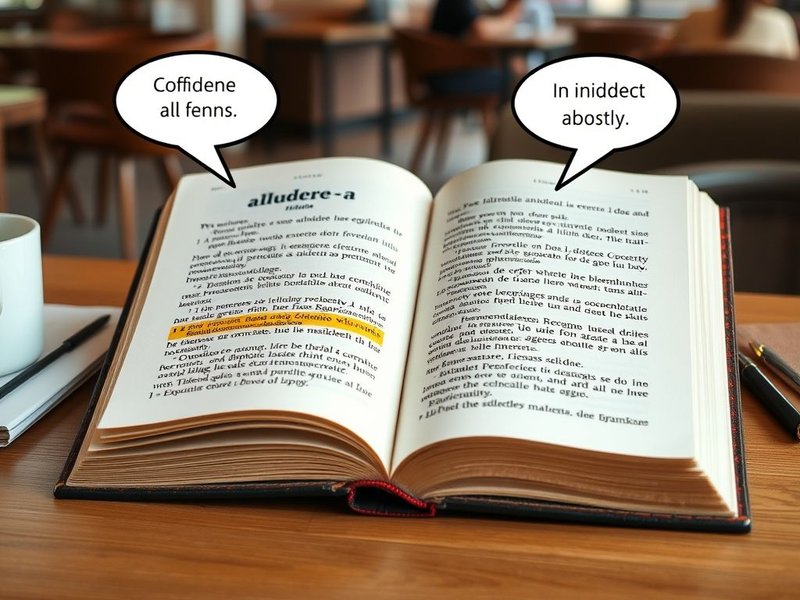How to Use "Alludere a": Meaning and Practical Examples
Have you ever wanted to communicate an idea without saying it directly? In everyday conversation, whether you're learning Italian or are an advanced speaker, sometimes it's useful to hint at something or someone without naming it directly. The expression "Alludere a" fits this use perfectly! It's one of those Italian phrasal verbs that lets you communicate with more nuance in Italian. But how do you use it correctly? In this guide, we'll explore the meaning of "Alludere a," its grammatical structure, look at practical examples, and learn how to avoid the most common mistakes. Get ready to add a new tool to your practical Italian vocabulary.

Table of Contents
- What does “Alludere a” mean?
- The Grammatical Structure: How Is It Used?
- Sentences and Examples with “Alludere a”
- Crucial Differences: Common Mistakes to Avoid
- Similar or Related Expressions
What does “Alludere a” mean?
The verb "alludere," as explained also by the Enciclopedia Treccani, means “to make an indirect mention or veiled reference to a thing or person.” Let's take a closer look at its meanings:
- Literal Meaning: To make an indirect mention or a veiled reference to something or someone.
- Example: "Il professore ha alluso a un tema già trattato."
- Figurative Meaning: To refer to something or someone implicitly, without naming them directly, often to suggest or imply.
- Example: "Quando ha detto "certi colleghi", alludeva chiaramente a Marco."
More: How to Use Aiutare a with Italian Examples for Natural Speaking
The Grammatical Structure: How Is It Used?
The verb "alludere" is intransitive. This means it does not take a direct object. Instead, the object of the indirect reference is always introduced by the preposition "a".
- Formula:
[Subject] + alludere + a + [Noun/Pronoun/Phrase]
The preposition "a" combines with definite articles to form articulated prepositions (alla, allo, all', ai, agli, alle), depending on the gender and number of the noun that follows. It's vital to keep this in mind for building correct sentences. For example, you say "alludere alla sua performance," not "alludere la sua performance".
More: Aggrapparsi a Meaning and Practical Examples
Sentences and Examples with “Alludere a”
Here are a few practical examples to better understand how this phrasal verb is used in different everyday situations. You'll notice how the expression "alludere a" naturally fits into Italian conversation.
📍 Office
Person A: "Il capo ha parlato di \"situazioni delicate\". Stava forse alludendo al nostro progetto in ritardo?"
Person B: "Penso proprio di sì. Non ha mai nominato il progetto, ma ha alluso a tutte le scadenze mancate."
📍 Family
Person A: "Mamma, papà ha alluso al tuo regalo di compleanno."
Person B: "Davvero? Spero non abbia alluso al prezzo!"
📍 News
Person A: "Il giornalista ha alluso a fonti anonime nella sua inchiesta."
Person B: "Sì, ha alluso a un insider senza dire chi fosse."
📍 Friends
Person A: "Marco ha alluso a un problema tra noi, ma non capisco a cosa si riferisca."
Person B: "Forse allude a quella discussione che avete avuto la settimana scorsa."
More: How to Use Aggiungere a with Practical Examples
Crucial Differences: Common Mistakes to Avoid
A common mistake is to confuse "alludere a" with similar expressions. Here’s the main difference to use them correctly.
Alludere a Vs. Fare riferimento a
Alludere a: Implies a suggestion, an insinuation, or an indirect reference, often to avoid bluntness or to communicate something "between the lines." Choosing "alludere a" often shows a wish not to be too direct, or to leave room for interpretation by the listener.
- Example: "Ha alluso alla situazione difficile senza mai usare la parola "crisi"."
Fare riferimento a: Simply means to mention or cite something or someone in a more direct and neutral way, without necessarily implying an insinuation. It's used when you want to clearly indicate the source or object of information or discussion.
- Example: "Il documento fa riferimento a tutti i dati raccolti lo scorso anno."
The choice between the two depends a lot on the speaker's tone and intention. If the goal is to be subtle, suggest, or even make a veiled accusation, "alludere a" is the right choice. If instead you want to merely cite or mention something in an objective and direct way, "fare riferimento a" is more appropriate.
Similar or Related Expressions
Besides "alludere a," there are other expressions that can help you communicate ideas in an indirect or subtle way. Knowing them will further enrich your practical Italian vocabulary.
| Similar Expression | Short Meaning | Example |
|---|---|---|
| Sottintendere | To imply something without saying it explicitly. | "Ha sottinteso che non era d'accordo." |
| Lasciar intendere | To communicate an idea indirectly, to hint at something without being clear. | "Con le sue parole, ha lasciato intendere che non sarebbe venuto." |
| Fare capire | To make information clear implicitly or explicitly. | "Con uno sguardo, mi ha fatto capire di tacere." |
Conclusion
Now you have all the tools to use "alludere a" with confidence! This verb is essential for expressing concepts indirectly and for adding nuance to your Italian. Remember its structure with the preposition "a" and the difference with similar expressions to communicate more effectively.
Give it a try! Leave a comment below with a sentence using "alludere a." We're curious to read your examples!